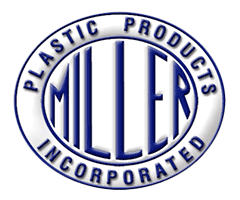Polypropylene (PP) is an economical material that offers a combination of outstanding physical, chemical, mechanical, thermal, and electrical properties not found in any other thermoplastic.
Compared to low or high density polyethylene, it has a lower impact strength but superior working temperature and tensile strength. It has excellent chemical resistance in corrosive environments where there are organic solvents, degreasing agents, or electrolytic attack, but poor resistance to aromatic, aliphatic and chlorinated solvents. It’s lightweight, non-staining, and exhibits a low moisture absorption rate.
It’s ideal for the transfer of hot liquids and gases, and in vacuum system atmospheres with high heat and pressure.
Polypropylene Material Properties Chart
Polypropylene for machining is available in 2 basic types: Homopolymer or Copolymer. Although similar, each exhibits distinct differences in both appearance and performance.
Homopolymer Polypropylene
Homopolymer Polypropylene is the PP most commonly used. It has a high strength to weight ratio and is stiffer and stronger than Copolymer. It exhibits good chemical resistance and weldability, which allows this material to be used in many corrosion-resistant structures.
View the Homopolymer Polypropylene Material Properties Chart
Copolymer Polypropylene
Copolymer Polypropylene is softer than Homopolymer but has better impact strength, is tougher, more durable, and has better stress crack resistance and low temperature toughness than Homopolymer.
View the Copoly Polypropylene Material Properies Chart
Generally many end-use applications for PP are achieved by tailoring grades with specific molecular properties and additives during manufacturing.
Polypropylene Advantages
- Lightweight
- Impact resistant
- High compressive strength
- Excellent dielectric properties
- Resists most alkalis and acids
- Resists stress cracking
- Retains stiffness and flexibility
- Low moisture absorption
- Non-toxic
- Non-staining
- Easily fabricated
- High heat resistance
Polypropylene Applications
- Chemical resistant tanks & linings
- Laboratory consoles, sinks and ducts
- Plating barrels and tanks
- Lavatory partitions
- Filter press plates
- ailroad crossing components
- Pump components and housings
- Prosthetic devices
- Die-cutting pads
- Clean room walls, floors and ceilings
Manufacturing Services
- Hot gas welding
- Spin welding
- Fusion and butt welding
- Machining with woodworking or metalworking tools
- Ultrasonic sealing
